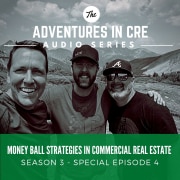Making the Masters in Real Estate Decision
This topic has come up on Adventures in CRE various times over the years. I first blogged about my decision to pursue a Masters in Real Estate over an MBA five years ago. And last year Michael, discussed his thought process around getting dual MBA and Masters in Real Estate degrees. We both shared our perspectives because this is a decision that many A.CRE readers have, or will have to, make at some point in their career.
In this episode of the Adventures in CRE Audio Series, we dive back into this topic. Specifically, we discuss for whom the Masters in Real Estate is ideal and share our thoughts on the benefits of this specialized degree.
This discussion is a good complement to our two-episode discussion with Jim Spaeth in season one on the MBA in Real Estate.
Making the Masters in Real Estate Decision
Watch as Spencer, Michael, and Sam discuss the decision to get a Masters in Real Estate (MSRED, MSRE, MPSRE, etc). As always with episodes produced during this pandemic, the guys are recorded remotely.
Or Listen to this Episode
Resources from this Episode
- A.CRE Accelerator: https://www.adventuresincre.com/accelerator
- More CRE Career Advice: https://www.adventuresincre.com/careers/
- Why a Masters in Real Estate: https://www.adventuresincre.com/why-i-chose-a-masters-in-real-estate-over-an-mba/
- Why an MBA in Real Estate: https://www.adventuresincre.com/why-i-chose-to-get-both-an-mba-and-mre/
Episode Transcript – Making the Masters in Real Estate Decision
Announcer (00:14):
Welcome to the Adventures In CRE audio series. Join Michael Belasco and Spencer Burton as they pull back the curtain on everything commercial real estate, and introduce you to some of the top minds in the industry. If you want to take your skills to the next level and be part of a growing community of CRE professionals across the world, this is for you.
Sam Carlson (00:39):
Welcome back to the audio series, you guys. We’re excited to be here today. We have a really cool subject that we’re going to share with you today, and that is why or why not you should get a master’s in real estate. We’ve done a previous podcast where we talked about getting an MBA. We get a lot of questions from our audience, so today we’re going to talk about these guys’ experience and some of their tips and tricks and different things, education on why you should consider a master’s in real estate. I will tip it over to Spencer to get us started.
Spencer Burton (01:14):
Yeah, thanks Sam. This is a topic that Sam mentioned that we get asked about a lot. I got a master’s in real estate. Michael got a dual MBA and master’s in real estate. That was a big decision that we both made 10 years ago. Why we went the certain routes we did, I had both the MBA and a master’s in real estate as an option. I chose the master’s in real estate for a couple of reasons. It was a good ideal fit for me, less so for others. There are certain individuals for whom the master’s in real estate is ideal. Others, the MBA might make more sense. We’re going to share our thoughts on that and kick it around. Maybe I’ll start with you, Michael. As you were thinking about that decision back in the good old days, why did you include a master’s in real estate in your graduate education? What was it about it that appealed to you?
Michael Belasco (02:06):
Yeah. For me, it was really the deep dive into the subject matter that I wanted to have a career and I want it to be in commercial real estate. I was always considering an MBA because that’s really the gold standard in terms of, I would say, maximizing your opportunities for job exposure just because it’s much more familiar, but the master in real estate allows you to really hyperfocus and gain some real expertise in the subject matter.
Michael Belasco (02:38):
Really, part one of that reason was for that, so I can get a deep dive, as much understanding, and an environment where I don’t have to work or do anything other than just focus and really pay attention to that topic, that issue. Then the other piece is the networks. I wanted to make sure that I was closely knit with people who had already decided and committed to going into commercial real estate as well, so that really was like a foundation for growing my network of peers and people that I could have conversations with at the same level, we’re kind of going through the same stuff. That really enabled me to jumpstart that network and that relationship. Those are really the two primary reasons I focused on.
Spencer Burton (03:21):
What I hear from you, the overarching message is focus. We’ve brought this up on quite a few podcasts. I find it interesting. It’s like there’s a power in focus and commitment. It rewires your brain in such a way that you commit to a path and that path comes around maybe faster or in a more advantageous way than you might expect. I think that was it, and part for me is I wanted to focus. Of course, I had already committed to commercial real estate. I’d been in the industry over 10 years by the time I decided to go back for a master’s in real estate, but being around people who have that similar focus, I totally get it and I agree with you. For me … Go ahead.
Sam Carlson (04:12):
Yeah. I was just going to say, just to not go pass this particular point too quickly. You both talked about the people that you surround yourself with, that being advantageous, and we’ve all heard that real estate is a relationship business, that that’s an extremely important part of putting deals together, making things happen, whatever the case may be. I’d be interested to hear your perspective and experience on how much that has come into play over your last 10 years, both in school, as well as in the work environment, what that has meant and what you can share at.
Michael Belasco (04:56):
Yeah. I’ll give one and then I’ll let Spencer chime in, Adventures in CRA. Spencer and myself, we met through that and we had all the time in the world. We had two years of doing the same thing together relatively, in the same classes, getting to know each other. That’s an environment that you can’t duplicate elsewhere, generally speaking. I would point that, and then I’ve constantly, I mean, I talked to a lot of my classmates fairly frequently and it’s through the ups and downs. It’s much more personal. You do the catch up and you meet a lot of people in real estate anyway, but these are people that you’ve gone through the trials and tribulations and insecurities of trying to break into cre. Those people, you kind of have a different level of relationship with. I’ll stop there. I’ll kick it over to you, Spencer. Let me hear, curious to hear your thoughts on that.
Spencer Burton (05:53):
Yeah. You’re spot on. I highly value the relationships that I built at Cornell. Michael and I did our graduate studies at Cornell. It gave us such a headstart coming out of that. Here you have this passionate group of real estate professionals that you spent two years with and you built this relationship and they kind of become the foundation of your network going forward. Network is so important in real estate. Having that foundation of high octane individuals who go disperse throughout the country or the world to practice real estate. Knowing that I can pick up the phone or I can send a text message and every single one of them will respond back immediately because of the bond that was built through that program. Getting almost philosophical, and I don’t mean that but it’s a great benefit. I hear of people suggesting, “You know, I could learn real estate analysis, real estate marketing, what have you. All the curriculum that you get out of a master’s in real estate, I could learn online.” And I don’t disagree with that, but you can’t replicate the relationships and the network that you build.
Michael Belasco (07:16):
Yeah. Now you would get … Cornell is unique with its master in real estate program. Not all universities have that. There are some MBA programs that are very, extremely reputable.
Spencer Burton (07:31):
Agreed.
Michael Belasco (07:33):
Wharton, Wisconsin, and I can name … I can go on …
Spencer Burton (07:35):
UNC, yeah.
Michael Belasco (07:39):
Yeah. We haven’t gone through them, but the networking and that relationship piece, I’m kind of honing in on here, where you probably get that in the MBA, but with the master in real estate, just based on my experience having done both, there’s just a 100% immersion. Where with the MBA, it’s getting the foundation, which by the way for me, the MBA and getting the foundational business knowledge was invaluable based on my background, but the deep dive immersion with the master in real estate really … It just really solidified my career trajectory and with those people in that same trajectory. I just want to add that with the networking piece, to just say that there’s … You probably get that with the MBA too.
Sam Carlson (08:27):
It’s probably pretty important to have a very good direction of where you want to be post your graduation …
Spencer Burton (08:36):
Oh yeah.
Sam Carlson (08:37):
… if you’re going to do a master’s in real estate. The benefit is A, you get to deep dive one particular topic, one category. You get to go deep on it for several years at a great program where you guys went. And then when you come out on the back end, assuming you have a plan, you can land … I’m assuming it’s easier to land a job that way, but if you are thinking of it from a perspective of, “I’m not entirely sure if I want to be in real estate,” for example. “Maybe I want to do something else. Maybe I want to be on Wall Street doing something else.” You probably ought to know, have a good idea of where you want to come out in the back end of this.
Spencer Burton (09:19):
Yeah, that’s definitely true. That gets to the question of, for whom is a master’s in real estate ideal? It’s that individual who knows real estate’s their career path. Because they’ve concentrated, they focused on real estate, they can spend two years or one year. Many master’s in real estate programs are one year, and that’s a whole different benefit that we could talk about on another day, but then you’re taking courses specific to your discipline. Rather than taking supply chain management or corporate finance classes that Michael finds really interesting, by the way. He loves to explore all these things that are completely unrelated to real estate, I find incredibly boring.
Spencer Burton (10:04):
When I was looking at options for graduate study, and there were several MBA programs that were an option. In fact, for a while, my number one, I won’t its name, but had a generalist MBA, one real estate class. I was kind of weighing that one. Great, great, great school, but weighing that against the master’s in real estate at Cornell, just the idea of taking some of these generalist MBA classes. I was older by the time. I was kind of early thirties by this point. It just sounded incredibly boring. But to your point, Sam, it’s a commitment. You got to be sure that real estate is the path you want to take, because otherwise you may spend a lot of money to only discover that you’re not into real estate.
Sam Carlson (10:52):
[crosstalk 00:10:52] master’s in real estate, or even an MBA in the upper echelons of the CRE world, where it’s maybe not a prerequisite or is it pretty much, if you want to get to the upper echelon of your career, that’s a box you need to check?Michael Belasco (11:13):
Getting a master in real estate?
Sam Carlson (11:15):
Yes.
Michael Belasco (11:15):
Is that what you’re asking? I would say it’s becoming more of a box these days. It is not the only way to get there. Real estate is becoming much more institutional now, much more sophisticated, just generally speaking. It’s garnered a lot of attention over the last … I mean, all the attention is constantly increasing from institutional side and people who come out it with a different bend. Prior to that, it was not very sophisticated. A lot of families would get into it. It was generational, but now if you want to get into some of the higher echelon or more reputable companies, it’s absolutely one of the check boxes. That’s not to say you can’t get into real estate and make a name for yourself, going many different avenues.
Michael Belasco (12:04):
I did want to add onto the previous question about the decision to go for the master in real estate and being really pigeonhole. This kind of dovetailing, both these questions, that there are so many avenues you could pursue within real estate, that there’s a lot of ways to the top. There’s a lot of decisions to make, even if you go for your master in real estate. You want to be a developer. You want to be in management. You want to be in acquisitions. You have analysis paralysis in your master in real estate too. To dovetail both, is there’s many avenues to the top and there’s many decisions to make about what career path you want to go within commercial real estate.
Spencer Burton (12:43):
That’s a good point. may have overstated the pigeon hole effect of a master’s in real estate, because there are a lot of paths, but you’re to focus in real estate. In terms of the other topic, which is … I lost my train of thought.
Sam Carlson (13:07):
Minute 13. I’ll write it down.
Spencer Burton (13:08):
What were we talking about right before that? I had a point in that.
Michael Belasco (13:12):
Yes. Is the master degree a check box?
Spencer Burton (13:14):
Oh yeah. Yeah. Okay. Just make a note. We’ll come back in right now.
Spencer Burton (13:20):
On that other point, is the master’s in real estate like a box that you have to check these days? Michael’s totally right. Real estate is becoming more institutionalized. In fact, in the early eighties, less than 1% of capital allocations that institutions were allocated to real estate. Now it’s 10%. I mean, you’re talking hundreds of billions of dollars that have been reallocated to real estate from other asset types. All of those institutions have a tradition of requiring advanced degrees in their professionals.
Spencer Burton (13:57):
It’s no different in real estate. The other piece about this too, it’s not just for those who want to go into corporate or institutional real estate. Investor class is becoming more sophisticated. Even the family offices and the traditional kind of mom-and-pop investors, they expect more from their sponsors than they used to. If you want to go out and start your own thing, there’s a lot of value in having a master’s in real estate, both in terms of credibility, in terms of what you learn, in terms of the network you build. I think progressively over time, it’s one of those degrees that if you want to compete, you’re probably going to have to get. There’s alternatives as well, MBAs in real estate, and the like that act as proxies for it.
Michael Belasco (14:48):
Yeah.
Sam Carlson (14:49):
I think you guys have made some awesome points. I think in conclusion, what are some parting words about what people need to know? We’ve said a lot of good things and we’ve got relationships. It gives you hyperfocus, but maybe just anybody considering it, what would be your recommendation or maybe some advice you would give to those people. We’ll start with you, Spencer.
Spencer Burton (15:14):
Yeah. Well, let me make one other point about the masters in real estate. I think it communicates to employers a commitment to real estate. If you come with a background in real estate and you go do an MBA, that’s a whole different thing. But for those who are career pivoters, a master’s in real estate can be a powerful way to communicate to the marketplace that, “Hey, I have a commitment to this. Yeah, I may not have experience, but I committed to do it.” Now to your question around parting words, and if you’re interested in a master’s in real estate, it’s just about introspection. What do you want for yourself in your career? Where do you want to go? Where have you been today?
Spencer Burton (15:55):
If you want to end up at an institutional shop or you want a true commitment to real estate, a master’s in real estate is a really good way to do that. It’s expensive, but you develop an incredible network. You learn. You get this foundation of knowledge that will benefit you and you communicate to investors or future employers a true commitment to the industry. That’s becoming more and more important. Michael?
Michael Belasco (16:23):
Well-
Sam Carlson (16:23):
Before you start, Michael. You’re not just paying for just the education, are you?
Spencer Burton (16:27):
No. No, of course not. Yeah. My way, my educational cost is … My ROI is through the roof. It’s been incredibly valuable to my career, wouldn’t change a thing for the world and I highly recommend it. Yeah.
Sam Carlson (16:47):
There you go. Sorry, Michael didn’t mean to interrupt you. Your turn on parting words.
Michael Belasco (16:53):
You’re right. I would echo that sentiment on ROI. My parting words is I want to point people to two articles that Spencer and I put on on Adventures in CRE discussing why Spencer chose master’s in real estate, why I chose the dual, because there’s a lot of considerations. It does signal to the market that you are committed to that industry. There’s other considerations, if you’re a career switcher is one. Part of that is, do you have an end company in mind and see what they are looking for and what they might look … In some companies, MBA is still the gold standard. Really, my parting words are to do the research introspectively the way Spencer put it. And then also, if you have an idea of where you want to go out the back end, try to connect in with those companies and learn a little bit more on what their expectations are and who they’re hiring, and where are they hiring from.
Michael Belasco (17:52):
Ultimately, the knowledge you get and the piece of paper that comes with that, no one will ever take that from you. Learning is obviously the biggest investment you can make is education and on yourself. It’s seen thousands of times over. It’s been a wonderful experience for me. I wouldn’t, again like Spencer, trade it for the world.
Sam Carlson (18:11):
Awesome. Thank you both so much. This has been fun, informative. Hopefully, if you’ve been listening, you’ve gotten a couple of your questions answered. I will say, as we kind of finish up here, we’ve been doing a lot more of these one-off episodes. That’s partially because of the whole coronavirus thing, and so doing season three might come later than we anticipated, but in the meantime, we will continue to do these episodes and produce more content. If you have questions, we’d love to hear them and we will feature them on the podcast. Until next time, thanks for coming guys.
Announcer (18:47):
Thanks for tuning into this episode of the Adventures in CRE audio series. For show notes and additional resources, head over to www.adventuresincre.com/audioseries. Would you like to learn real estate financial modeling in a matter of weeks and do it with zero guesswork? If so, the A.CRE Accelerator is for you. The Accelerator is a step-by-step case-based program designed to teach you exactly what you need to know and in the order you need to know it, so you can gain both the knowledge and experience to take your career to the next level. To see if the Accelerator is right for you. Go to www.adventuresincre.com/accelerator.








